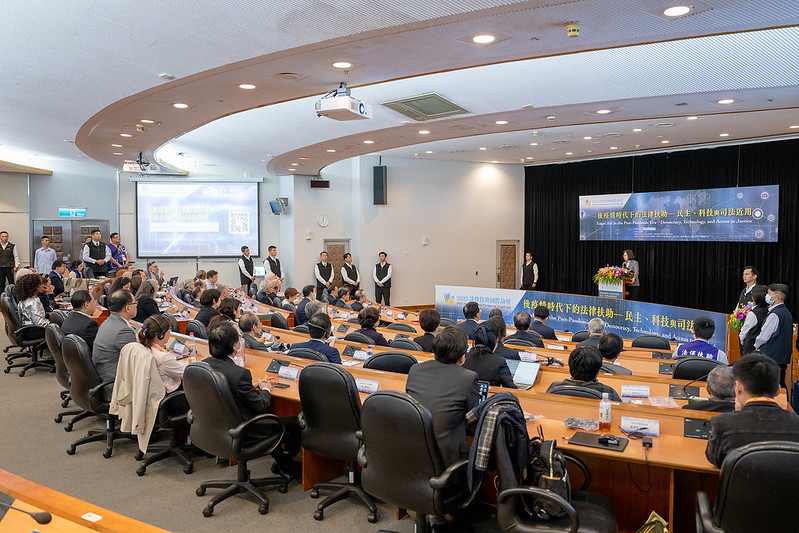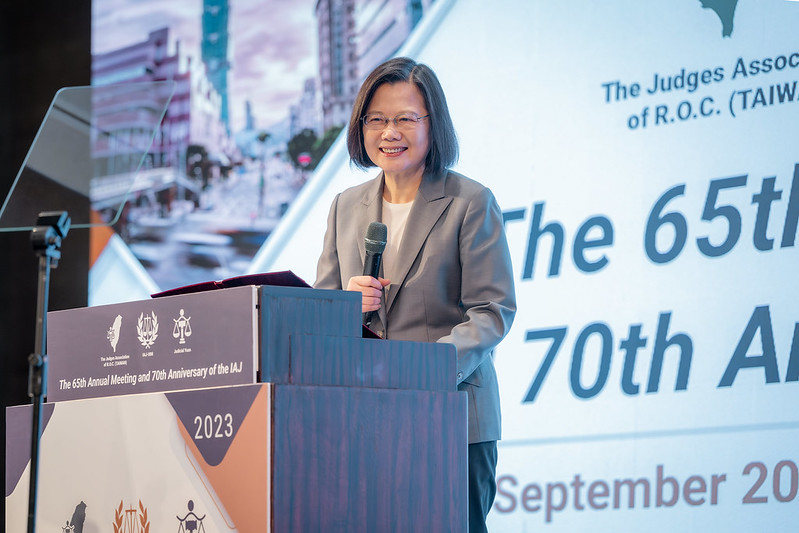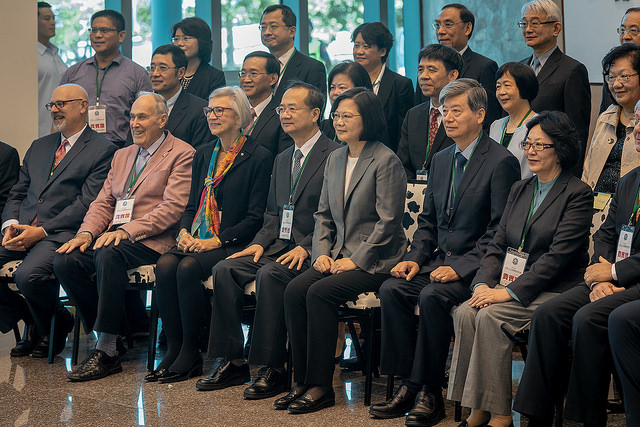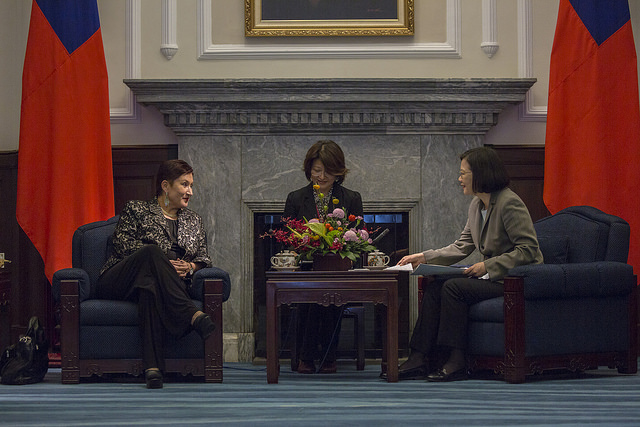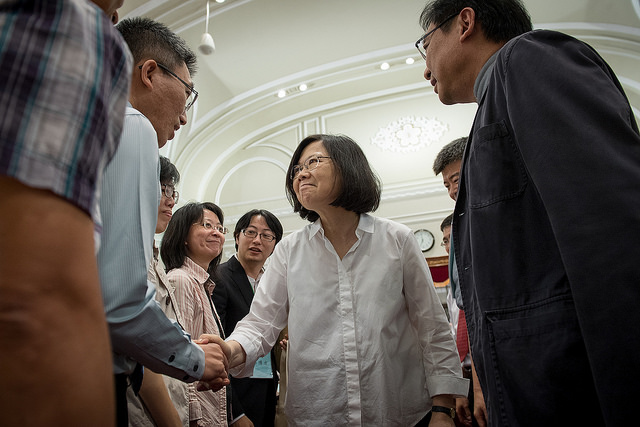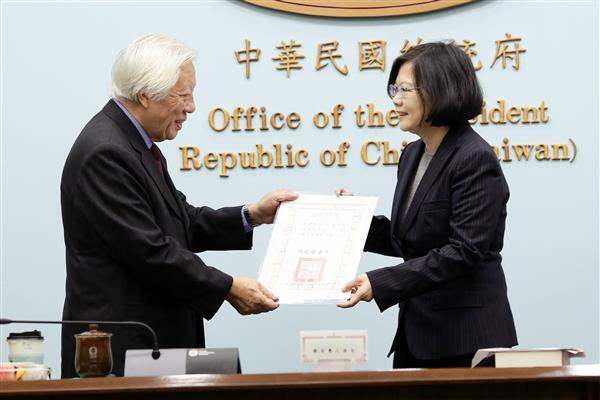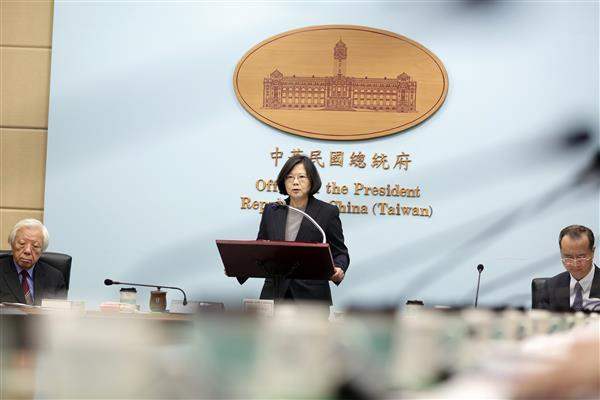News & activities
 News releases
News releases
On the morning of November 25, President Tsai Ing-wen presided over the first meeting of the Preparatory Committee for the National Conference on Judicial Reform. Delivering remarks in her capacity as convener of the Preparatory Committee, the president thanked the committee members for taking part in the judicial reform process, by which Taiwan seeks to build a judicial system capable of responding to the needs of the public. We intend to achieve progress toward judicial reform, she said, by relying on "diverse voices and broad popular participation."
The following is a translation of President Tsai's remarks:
The Preparatory Committee for the National Conference on Judicial Reform meets for the first time today. As the convener of this committee, I would first like to thank the committee members for your willingness to work together to push the judicial reform project forward.
When I mentioned judicial reform in my inaugural address on May 20 this year, it elicited a round of applause in the audience, which showed me that the people of Taiwan have a strong desire for judicial reform. The people want a fairer judicial system. They don't want judges who are out of touch with society, or a system where how much money you have can affect judicial outcomes. The people also want a more efficient judicial system. They don't want proceedings that drag on interminably and affect one's ability to lead a normal life.
I know that a lot of people on the front lines of the judicial system work very hard. It has never been my intention to use a broad brush to negate the contributions they've made to judicial fairness. However, I want to remind everyone that the people's desire for judicial reform has never flagged. That is why we've convened this meeting here today.
As the convener of this committee, I want to take advantage of this opportunity to address three matters in particular.
First, judicial reform is a very complex subject that involves many different specialties and has a deep impact upon the rights and interests of the public. For that reason, we should involve not only legal experts, but also experts from other fields, and members of the general public affected by judicial cases. This is the only way to ensure that the process of reform goes smoothly.
The committee members with us here today have expertise in law, government, media, energy, finance, business, social advocacy, social service, and various other fields. Also on the committee is Ms. Claire Wang (王婉諭), whose daughter's suffering at the hands of a criminal is only too well known.
I want to specially thank Ms. Wang for her willingness, after losing her child, to step forward and work with us to contribute to judicial reform.
Second, I understand that our people want judicial reform to create a system that belongs to the people and lowers the barriers to popular participation. They want a judicial system that responds to the needs of the people, safeguards human rights, and upholds social justice. And they want a system that is professional and transparent.
All of our work will be to achieve these objectives. Many initiatives that are ready to launch should start immediately. Observers have long argued, for example, that information on which cases are assigned to which judges should be a matter of public record. There are also strong calls to allow for oral arguments when highly controversial cases come before the Supreme Court. And in fact, we are already working on these reforms.
In holding the National Conference on Judicial Reform, our purpose is to accelerate and improve the reform process, and ensure that it moves forward more steadily.
Third, we intend to push for judicial reform by relying on "diverse voices and broad popular participation."
The reason we've established the Preparatory Committee for the National Conference on Judicial Reform is to listen to the views of the people. Members of the public are welcome one and all to share their ideas with us at any time. They can contact us via the Internet. They can send letters or official documents. Or they can even call in by phone, because I firmly believe that relying on "diverse voices and broad popular participation" is the only way to move judicial reform forward.
Taiwan convened a national conference on judicial reform 17 years ago. On that occasion, a group of legal experts got together and determined the direction of the first round of judicial reform to take place in the wake of Taiwan's transition to democracy.
Now, in convening the National Conference on Judicial Reform, our only goal is to implement a second round of judicial reform in which the views of the general public are included in the discussion.
Reform may be difficult, and the issues may be large and complex. But faced with the expectations of the people, we have no time to waste. I want to urge each of the committee members to keep the need for efficiency uppermost in mind so that our judicial reform work can yield results as soon as possible.
I realize that the task at hand is quite difficult, but we all understand very clearly that reform has never been a simple matter. Our work will begin shortly. I hope that today, the 25th of November, will mark the beginning of the second round of judicial reform since Taiwan's transition to democracy. Let us all work together toward that end.
After concluding her remarks, President Tsai presented letters of appointment to committee members, which were accepted on behalf of the other members by Deputy Committee Convener Hei-yuan Chiu (瞿海源), an adjunct research fellow at the Academia Sinica's Institute of Sociology .
The following committee members were present at the meeting: Hsu Tzong-li (許宗力; President, Judicial Yuan); Chiu Tai-san (邱太三; Minister of Justice); Claire Wang (mother of a crime victim); Nigel N. T. Li (李念祖; Adjunct Professor of Law, Soochow University); Lee Chen-hui (李振輝; Advisor, Chinese National Association of the Deaf, R.O.C.); Fei-peng Ho (何飛鵬; Chief Executive Officer, Cité Media Holding Group); Tzu-Yi Lin (林子儀; Director, Institutum Iurisprudentiae, Academia Sinica); Kao Ju-ping (高茹萍; Chairperson, Taiwan Renewable Energy Alliance); Yu-hsiu Hsu (許玉秀; Former Grand Justice); Hawang Shiow-duan (黃秀端; Professor, Soochow University Department of Political Science; Dean, Soochow University School of Liberal Arts and Social Sciences); Yang Yun-hua (楊雲驊; Professor, College of Law, National Chengchi University); Lenyu Liu (劉連煜; Chairman of Taiwan Futures Exchange Corporation); Hsiu-Chuan Tsai (蔡秀涓; Associate Professor, Soochow University Department of Political Science; Standing Supervisor, Transparency International Chinese Taipei); and Lo Ping-cheng (羅秉成; Chairperson, Legal Aid Foundation, Taiwan).
